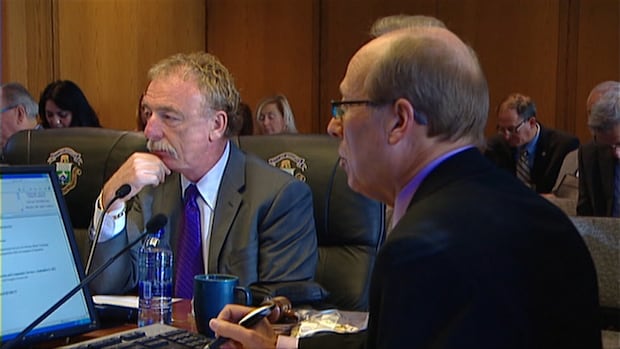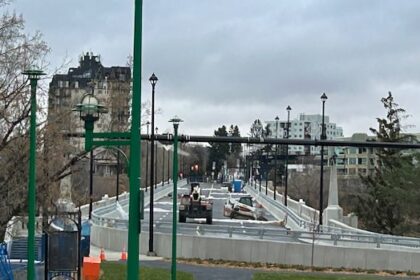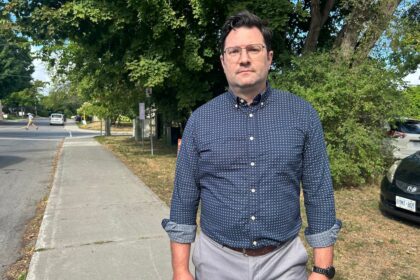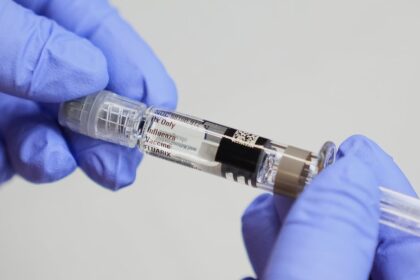ManitobaFormer Winnipeg mayor Sam Katz and a top bureaucrat found to have accepted a bribe from the contractor responsible for the city’s police headquarters are expected to be among those called to testify during the public inquiry into the construction project, a lawyer for the inquiry said Wednesday.Long-awaited inquiry scheduled to run 44 days, from February to JuneCaitlyn Gowriluk · CBC News · Posted: Sep 10, 2025 1:55 PM EDT | Last Updated: 5 hours agoFormer city chief administrative officer Phil Sheegl, left, and Sam Katz, who was the city’s mayor from 2004 to 2014, are anticipated to be two of the roughly 30 witnesses called as part of the police headquarters inquiry when it begins next year. (CBC)Former Winnipeg mayor Sam Katz and a top bureaucrat found to have accepted a bribe from the contractor responsible for the city’s police headquarters are expected to be among those who testify during the public inquiry into the project, a lawyer for the inquiry said Wednesday.Katz, who was mayor from 2004 to 2014, and former city chief administrative officer Phil Sheegl are anticipated to be two of the roughly 30 witnesses called as part of the long-awaited inquiry when it begins next year, inquiry counsel Heather Leonoff said following a procedural inquiry hearing Wednesday.”They both have counsel here today, and that is a good indication that both of them will be testifying,” Leonoff said.More details about who else will be called will be shared closer to the start of the inquiry, she said.”I have to whittle down who’s the right witnesses — what’s the best way to tell the story, if you will.”The police HQ project, which saw the city purchase a former Canada Post office and warehouse complex and convert it into the new home of the Winnipeg Police Service, was completed in 2016 for $214 million, $79 million over the council-approved budget in 2011.The city purchased a former Canada Post office and warehouse complex and converted it into the new home of the Winnipeg Police Service, shown here. (Tyson Koschik/CBC)The project was the subject of two external audits, a five-year RCMP investigation that concluded in 2019 without any charges and civil litigation by the city against Sheegl, primary contractor Caspian Construction and other contractors.The bulk of Wednesday’s hearing focused on applications from people and groups seeking standing for part or all of the inquiry. Those who got standing include the city, the Winnipeg Police Service, Sheegl, Katz, Caspian and its principal Armik Babakhanians, and a number of other people and companies linked to the police headquarters project.The hearing came months ahead of the actual inquiry hearings, which are scheduled for 44 days, from February to June.The inquiry is expected to examine the circumstances surrounding the project and determine what measures are needed to restore public confidence in the city’s ability to build large, publicly funded projects.The province selected labour lawyer Garth Smorang to serve as the commissioner for the inquiry, which was initially requested by a Winnipeg city council led by then-mayor Brian Bowman in 2017.The litigation against Sheegl concluded in 2022, with a court ruling the former CAO accepted a $327,200 bribe from Babakhanians and must pay the city $1.1 million.Sheegl lost an appeal of that decision in 2023, when an appeal court determined he engaged in 14 breaches of duty from 2010 to 2012 — and that former Winnipeg mayor Sam Katz can be considered a material witness, even though he was not a party to the lawsuit and is not accused of any wrongdoing.The city’s lawsuit against Caspian and other contractors was settled in 2023, when Babakhanians and the other defendants agreed to pay the city no less than $21.5 million.’Money trail’During Wednesday’s hearing, Smorang laid out the five sections the inquiry will be broken into, with an initial phase in February focused on a series of events related to the redevelopment of the former Canada Post building.Leonoff said that phase will examine “whether that was a valuable decision for the city.”That will be followed by another phase in March referred to as “the money trail” by the inquiry, which will examine funds the city spent to complete the project and who they went to, she said.In April, the third phase — an examination of the city’s policies and practices then and now for similar projects — is scheduled to begin.That will be followed in May by a fourth phase focused on recommendations for change, which will primarily feature expert witnesses, Smorang said.Submissions from lawyers — the fifth and final phase of the inquiry — are scheduled to happen in June, he said.Smorang also said a number of people either have been or may be served with a notice of misconduct, which he said advises them that evidence may be tendered during the inquiry that would call their conduct into question.Those notices are served confidentially, and anyone who gets one has the right to fully participate in the hearing and defend themselves with a lawyer, he said.The exterior of the Winnipeg Police Service’s downtown headquarters is shown in July 2019. The project was the subject of two external audits, a five-year RCMP investigation that concluded in 2019 without any charges and civil litigation by the city against Phil Sheegl, primary contractor Caspian Construction and other contractors. (Tyson Koschik/CBC)The inquiry will be far narrower in scope than the inquiry city council formally requested from the provincial government.In 2017, when Brian Pallister was Manitoba’s premier and Bowman was Winnipeg’s mayor, city council voted to ask the province to launch a public inquiry into “any and all matters” related to the construction of Winnipeg’s police headquarters and a series of municipal real estate transactions that were examined in a 2014 external review.A broader inquiry on that scale likely would have cost the province more than the $2 million the government has budgeted for this inquiry.Smorang has been provided with a limited time frame for the inquiry, and must submit a completed report by Jan. 1, 2027.ABOUT THE AUTHORCaitlyn Gowriluk has been writing for CBC Manitoba since 2019. Her work has also appeared in the Winnipeg Free Press, and in 2021 she was part of an award-winning team recognized by the Radio Television Digital News Association for its breaking news coverage of COVID-19 vaccines. Get in touch with her at caitlyn.gowriluk@cbc.ca.Follow Caitlyn Gowriluk on XWith files from Bartley Kives
Friday, 6 Feb 2026
Canada – The Illusion
Search
Have an existing account?
Sign In
© 2022 Foxiz News Network. Ruby Design Company. All Rights Reserved.
You May also Like
- More News:
- history
- Standing Bear Network
- John Gonzalez
- ᐊᔭᐦᑊ ayahp — It happened
- Creation
- Beneath the Water
- Olympic gold medal
- Jim Thorpe
- type O blood
- the bringer of life
- Raven
- Wás’agi
- NoiseCat
- 'Sugarcane'
- The rivers still sing
- ᑲᓂᐸᐏᐟ ᒪᐢᑿ
- ᐅᑳᐤ okâw — We remember
- ᐊᓂᓈᐯᐃᐧᐣ aninâpêwin — Truth
- This is what it means to be human.
- Nokoma











